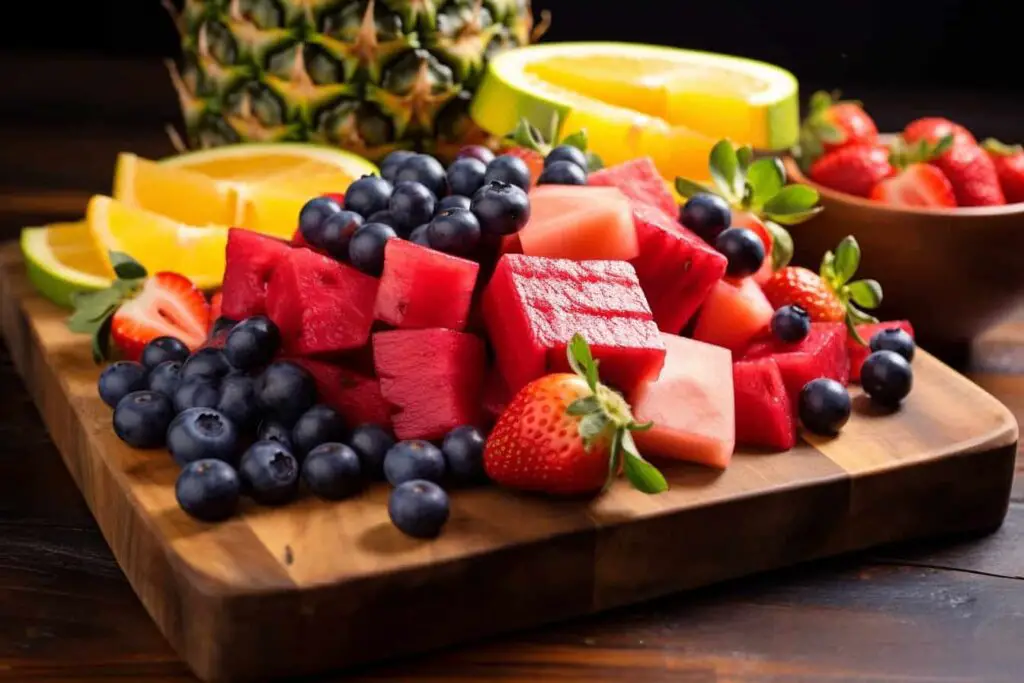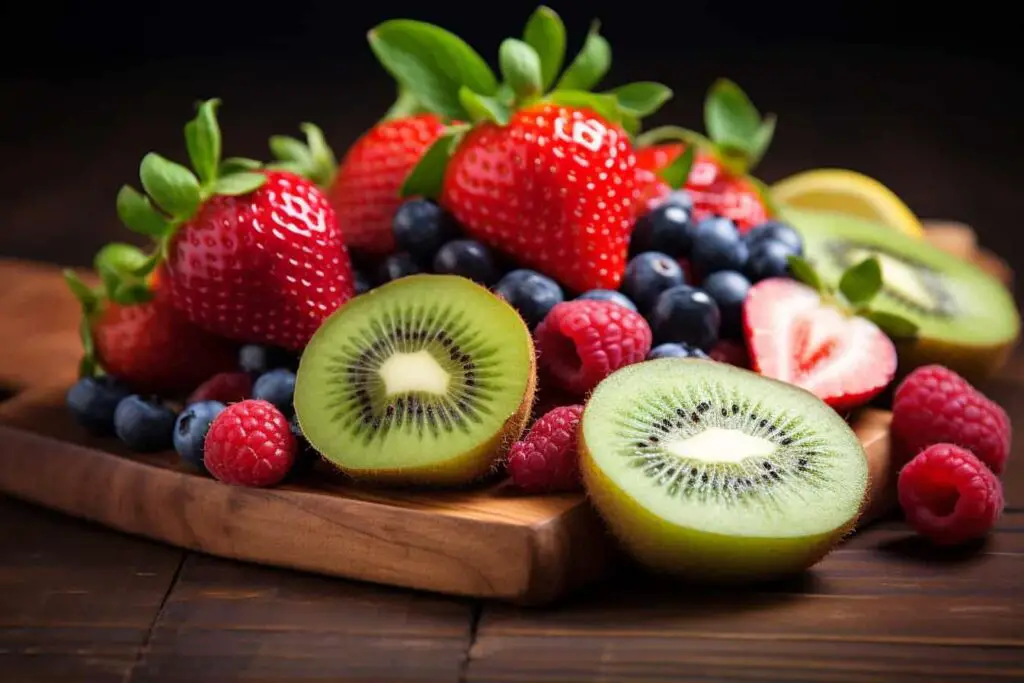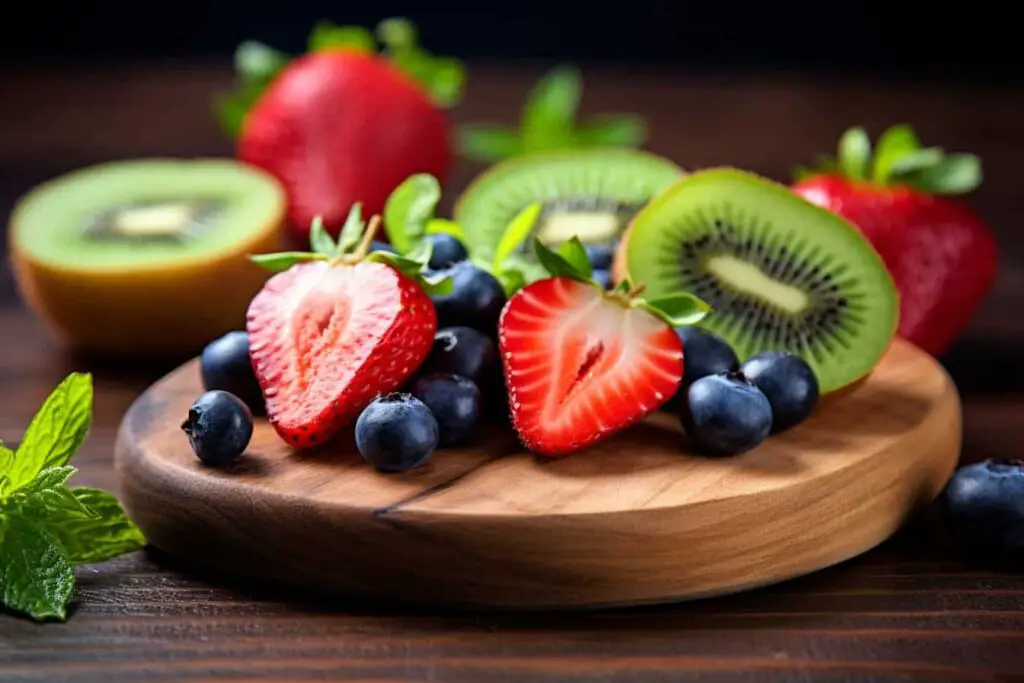Are you tired of dealing with the uncomfortable symptoms of IBS?
Well, look no further! In this article, we will guide you through the best low FODMAP fruits for an IBS diet.
By incorporating these fruits into your daily meals, you can find relief and enjoy a more comfortable lifestyle. Say goodbye to bloating and digestive issues, and say hello to a healthier, happier you!
So, let’s dive in and discover the fruits that are perfect for your IBS diet.
- Related: Foods to Eat With IBS

Key Takeaways
- Certain fruits like bananas, blueberries, grapes, citrus fruits (oranges, lemons, and limes), kiwi, and pineapple are low FODMAP fruits that can help ease IBS symptoms.
- Dried fruits such as apricots, dates, and prunes are high in FODMAPs and should be avoided or limited in an IBS diet.
- Moderation is key when consuming fruit for an IBS diet, and certain fruits may be better tolerated when cooked or peeled.
- Consulting with a healthcare professional or registered dietitian is recommended to determine the right portion sizes and preparation methods for incorporating low FODMAP fruits into an IBS diet.
Understanding IBS and Diet Link
If you’ve been diagnosed with irritable bowel syndrome (IBS), you know how challenging it can be to manage your symptoms.
One key aspect of managing IBS is understanding the role of diet in your overall management plan.
The Basics of IBS
IBS is a chronic digestive disorder characterized by symptoms such as abdominal pain, bloating, and changes in bowel movements. It is important to understand the basics of IBS in order to effectively manage its symptoms.
IBS is a complex condition with various contributing factors, including diet. While the exact cause of IBS is unknown, certain foods can trigger or worsen symptoms.
This is why the role of diet in managing IBS is crucial. By identifying and avoiding trigger foods, individuals with IBS can experience relief from their symptoms.
Some common trigger foods include high-fat foods, caffeine, alcohol, and spicy foods. It is also recommended to eat smaller, more frequent meals and to stay hydrated.
Understanding the basics of IBS and its relationship with diet can help individuals better manage their symptoms and improve their quality of life.

The Role of Diet in IBS Management
To manage your symptoms of IBS, it’s important to be mindful of the foods you eat and how they may affect your digestive system.
While everyone’s triggers may be different, there are some general guidelines that can help you make informed choices when it comes to your diet.
Here are some key points to consider:
- Low FODMAP diet: Following a low FODMAP diet can be beneficial for individuals with IBS. FODMAPs are fermentable carbohydrates that can trigger symptoms. By avoiding high FODMAP foods, you can reduce IBS flare-ups.
- Fiber intake: Increasing your fiber intake can help regulate bowel movements and improve overall gut health. However, it’s important to choose low FODMAP sources of fiber, such as oats, quinoa, and carrots.
- Probiotics: Probiotics are beneficial bacteria that can help restore the balance of gut flora. Consuming probiotic-rich foods like yogurt and kefir can potentially reduce IBS symptoms.
What Are FODMAPs
If you’ve been experiencing digestive distress, it may be helpful to understand the role of FODMAPs in your symptoms.
FODMAPs, which stands for fermentable oligosaccharides, disaccharides, monosaccharides, and polyols, are types of carbohydrates that can be difficult to digest for some individuals.
- Oligosaccharides include fructans and galacto-oligosaccharides, which are found in foods like wheat, onions, and legumes.
- Disaccharides are made up of lactose, found in dairy products.
- Monosaccharides include excess fructose, found in certain fruits and sweeteners.
- Polyols include sugar alcohols like sorbitol and mannitol, which can be found in some fruits and artificial sweeteners.
When there are a high amount of FODMAPs, they can trigger symptoms such as bloating, gas, abdominal pain, and diarrhea in people with IBS.
When FODMAPs reach the large intestine, they are fermented by bacteria, causing gas and water to be produced, leading to discomfort.
By limiting or avoiding high FODMAP foods, you can reduce these symptoms and improve your gut health.
It is important to note that not all FODMAPs are bad for everyone with IBS, as sensitivities can vary.
Working with a healthcare professional or registered dietitian can help you determine which FODMAPs to limit and which ones are better tolerated for you.

Low FODMAP Fruits to Include in an IBS Diet
Include bananas, blueberries, and grapes in your IBS diet as they are low FODMAP fruits that can help alleviate symptoms. These fruits are safe to consume in moderation for individuals with IBS due to their low levels of fermentable carbohydrates known as FODMAPs.
By choosing low FODMAP fruits, you can enjoy the benefits of their nutrients without exacerbating your IBS symptoms.
Here are some other low FODMAP fruits that you can incorporate into your diet:
- Citrus fruits: Oranges, lemons, and limes are all low in FODMAPs and can provide a good source of vitamin C.
- Kiwi and pineapple: These fruits are low in FODMAPs and can add a tropical twist to your diet while providing essential vitamins and minerals.
Fruits to Avoid with IBS: High FODMAP Fruits
Avoiding high FODMAP fruits can help manage symptoms of IBS. When it comes to choosing fruits for an IBS diet, it’s important to be mindful of their FODMAP content.
Here are some high FODMAP fruits to avoid if you have IBS:
- Cherries: These delicious fruits may be tempting, but they contain excess fructose, which can worsen digestive issues in individuals with IBS.
- Watermelon: This refreshing fruit can be a summer favorite, but it contains high levels of fructose, which can lead to symptoms in individuals with IBS. Try opting for low FODMAP fruits such as cantaloupe or honeydew melon instead.
Citrus Fruits and IBS: The Good and the Bad
When it comes to citrus fruits and your IBS symptoms, it’s important to know which ones can be beneficial and which ones to be cautious of.
Citrus fruits are a great source of vitamin C and other nutrients, but they can also be high in FODMAPs, which are fermentable carbohydrates that can trigger IBS symptoms.
It’s best to choose citrus fruits that are lower in FODMAPs, such as oranges, mandarins, and grapefruits. These fruits are generally well-tolerated by most people with IBS.
However, you should be cautious with fruits like lemons, limes, and tangerines, as they can be higher in FODMAPs and may cause symptoms.
It’s always a good idea to listen to your own body and pay attention to how different citrus fruits affect your IBS symptoms.
Stone Fruits: What You Need to Know
Peaches, plums, and apricots are delicious options to consider if you have IBS and want to enjoy stone fruits. These fruits belong to the Rosaceae family and are generally well-tolerated by individuals with IBS.
Stone fruits are low in FODMAPs, which are types of carbohydrates that can trigger digestive symptoms in some people. They are also rich in vitamins, minerals, and antioxidants, making them a healthy choice for anyone, including those with IBS.
However, it’s important to note that everyone’s tolerance to different fruits may vary, so it’s best to listen to your body and consume them in moderation. If you find that certain stone fruits worsen your IBS symptoms, you may want to limit or avoid them.
As always, it’s a good idea to consult with a healthcare professional or registered dietitian for personalized advice.

Dried Fruits and IBS: What are the Concerns
Dried fruits may not be the most suitable option for IBS due to their high fiber content. While dried fruits are generally considered healthy and nutritious, they can be problematic for individuals with IBS.
Here are some reasons why dried fruits may not be the best choice for IBS patients:
- High FODMAP content: Some dried fruits, such as apricots, dates, and prunes, are high in FODMAPs, which are fermentable carbohydrates that can trigger IBS symptoms.
- Concentrated sugars: Drying fruits removes their water content, resulting in a more concentrated form of sugar. This can trigger symptoms for individuals with IBS, such as diarrhea or cramping.
- Concentrated fiber: Drying fruits also results in a higher concentration of fiber. This can be difficult for individuals with IBS to digest, potentially leading to abdominal discomfort.
It is important for individuals with IBS to be mindful of their dried fruit intake and consider alternatives that are lower in fiber and FODMAPs.
Food and Diet Choices for IBS Sufferers
If you’re someone who suffers from IBS, you may already be familiar with the challenges of managing your symptoms through diet. One approach that has gained significant attention in recent years is the Low FODMAP Diet. This diet involves restricting certain types of carbohydrates that can trigger IBS symptoms.
However, it’s important to note that there are alternative dietary approaches that may also be beneficial for IBS sufferers.
- Discover the key principles of the Low FODMAP Diet and how it can help manage your IBS symptoms.
Explore alternative dietary approaches that can provide relief for IBS, such as the Specific Carbohydrate Diet and the Gut and Psychology Syndrome (GAPS) Diet.
Introduction to the Low FODMAP Diet
To start the Low FODMAP Diet, you’ll want to familiarize yourself with the principles and guidelines.
This diet is designed to help manage symptoms of IBS by reducing the intake of certain carbohydrates known as FODMAPs. These are types of carbohydrates that can be difficult for some people to digest, leading to symptoms like bloating, diarrhea, and gas.
By following a low FODMAP diet, you can identify and avoid foods that trigger these symptoms.
It’s important to note that this diet is not meant to be followed long-term, but rather as a short-term elimination phase, followed by a gradual reintroduction of FODMAPs to determine individual tolerances.
The Low FODMAP Diet involves a three-phase approach: elimination, reintroduction, and personalization. During the elimination phase, high FODMAP foods are removed from the diet for a period of time to determine if symptoms improve.
The reintroduction phase involves systematically reintroducing specific FODMAPs to identify which ones trigger symptoms. Finally, the personalization phase involves creating an individualized diet plan that avoids only the FODMAPs that cause symptoms.
Consulting a registered dietitian who specializes in the low FODMAP diet is recommended to ensure proper guidance and support throughout the process.
To help you make informed choices, here is a table highlighting some low FODMAP fruits that are suitable for an IBS diet:
| Fruit | Serving Size | FODMAP Content |
|---|---|---|
| Bananas | 1 medium | Low |
| Blueberries | 1/2 cup | Low |
| Oranges | 1 medium | Low |
Including these fruits in your diet can provide you with essential vitamins, minerals, and fiber while minimizing your symptoms. However, it’s important to remember that everyone’s tolerance to FODMAPs may vary, so it’s best to consult with a healthcare professional or registered dietitian before making any significant changes to your diet.

Alternative Dietary Approaches
If you’re looking for other dietary options to manage your IBS symptoms, you might consider trying a gluten-free or lactose-free diet. These diets can be helpful for individuals with IBS who also have sensitivities to gluten or lactose.
Going gluten-free involves avoiding foods that contain gluten, which is a protein found in wheat, barley, and rye.
On the other hand, a lactose-free diet involves eliminating or reducing the consumption of dairy products that contain lactose, a sugar found in milk and other dairy products.
Here’s a handy table that compares the gluten-free and lactose-free diets:
| Gluten-Free Diet | Lactose-Free Diet |
|---|---|
| Avoid foods containing gluten such as wheat, barley, and rye | Limit or eliminate dairy products containing lactose |
| Focus on naturally gluten-free foods like fruits, vegetables, and lean proteins | Opt for lactose-free alternatives like lactose-free milk or dairy-free products |
| Read food labels carefully to avoid hidden sources of gluten | Consider taking lactase supplements to help digest lactose |
| Consult with a healthcare professional or a registered dietitian for guidance | Experiment with lactose-free recipes and alternatives to maintain a balanced diet |
These diets can be effective in reducing symptoms such as diarrhea, gas, and bloating and in individuals with IBS. However, it’s important to consult with a healthcare professional or a registered dietitian before making any significant dietary changes.
Tips for Incorporating Fruit into Your IBS Diet
When it comes to incorporating fruit into your IBS diet, moderation is key. While fruit can provide important nutrients and fiber, consuming too much can trigger symptoms for those with IBS.
It’s important to consider preparation methods as well, as certain fruits may be better tolerated when cooked or peeled.
Keeping a food diary can be a helpful tool in identifying which fruits work best for your individual needs and managing your IBS symptoms effectively.
Moderation is Key
Eating low FODMAP fruits in moderation is key for an IBS diet. While fruits are generally healthy, some can be high in FODMAPs, which are types of carbohydrates that can trigger IBS symptoms.
By incorporating low FODMAP fruits into your diet and consuming them in moderation, you can enjoy the benefits of fruits while minimizing symptoms. Some examples of low FODMAP fruits include bananas, blueberries, strawberries, kiwi, and oranges. These fruits are not only delicious but also packed with essential vitamins, minerals, and antioxidants.
However, it is important to remember that everyone’s tolerance to FODMAPs can vary, so it’s best to work with a registered dietitian to determine the right portion sizes for you. By practicing moderation, you can still enjoy the goodness of fruits without exacerbating your IBS symptoms.

Consider Preparation Methods
Incorporating different preparation methods can help maximize the enjoyment and nutritional value of low FODMAP fruits in an IBS-friendly diet.
When it comes to preparing low FODMAP fruits, there are a few techniques you can try.
First, consider cooking or baking them. This can help break down the FODMAPs and make them easier to digest. For example, you can grill pineapple or bake apples with a sprinkle of cinnamon for a delicious treat.
Blending low FODMAP fruits into smoothies or purees can be a great way to enjoy them while also increasing their nutritional value.
Lastly, try combining low FODMAP fruits with other ingredients to create flavorful salads or salsas.
Keep a Food Diary
Keeping a food diary of the fruits you eat can be a helpful tool in identifying triggers and managing symptoms of IBS. By tracking what you eat and how it affects your symptoms, you can start to see patterns and make informed decisions about your diet.
When keeping a food diary, make sure to include details such as portion sizes, preparation methods, and any symptoms experienced. This will help you pinpoint specific foods or ingredients that may be causing discomfort.
Additionally, noting other factors like stress levels and physical activity can provide valuable insights into your overall gut health.
Remember to be consistent and diligent in recording your food intake and symptoms. Over time, you will be able to tailor your diet to better manage your IBS symptoms and improve your overall well-being.
Consult with a Dietitian or Healthcare Provider
Before making any significant changes to your diet, it’s important to consult with a dietitian or healthcare provider. They can provide you with personalized advice and guidance based on your unique needs and health history.
A dietitian or healthcare provider can help you understand the impact of certain foods on your body, especially if you’re considering a low FODMAP diet for IBS. They can assess your current dietary habits, identify potential triggers, and create a customized plan that meets your nutritional needs while managing your symptoms.
Additionally, they can monitor your progress and make any necessary adjustments along the way. Keep in mind that everyone’s body is different, so what works for one person may not work for another. By consulting with a professional, you can ensure that your diet changes are safe, effective, and tailored to your specific needs.

Fruit Choices for IBS Final Thoughts
When selecting fruits for your IBS diet, it’s crucial to pay attention to how your body reacts to each type and determine which ones work best for you. While there are many low FODMAP fruits that are generally well-tolerated by individuals with IBS, it’s important to remember that everyone’s body is unique.
It’s important to listen to your body and make note of any symptoms or discomfort that may arise.
If you notice that certain fruits trigger symptoms, it may be best to avoid or limit your intake of those fruits. Talk with a registered dietitian for personalized guidance and support for your specific needs.
Happy fruit hunting! Here are popular fruits many people ask about:
Fruits and IBS FAQs
Are you wondering what fruits are best for someone with IBS? Or whether citrus is harmful or beneficial for IBS patients?
Maybe you’re curious about how dried fruits impact IBS symptoms or why some fruits are considered low FODMAP while others aren’t.
And what about stone fruits? Are they risky for IBS patients?
Let’s explore these frequent questions and provide evidence-based answers.
1. What Fruits are Best for Someone with IBS
The best low FODMAP fruits for someone with IBS include bananas, blueberries, and strawberries. These fruits are ideal for an IBS diet because they have a low FODMAP content. FODMAPs are a type of carbohydrate that can trigger IBS symptoms such as bloating, stomach pain, and gas.
Bananas are a great choice as they are easily digestible and provide essential nutrients like potassium and vitamin C. Blueberries are rich in antioxidants and fiber, which can promote gut health and ease digestion. Strawberries are also low in FODMAPs and offer a good source of vitamin C and dietary fiber.
When selecting fruits for an IBS diet, it is important to choose those with low FODMAP levels to minimize symptoms and support digestive health.
2. Is Citrus Harmful or Beneficial for IBS Patients
You might be surprised to learn that citrus can actually be beneficial for managing your IBS symptoms.
While it is commonly believed that citrus fruits should be avoided due to their acidity, recent research suggests that they can be safely consumed by individuals with IBS.
Citrus fruits like oranges, lemons, and grapefruits are rich in vitamin C and fiber, which can help regulate bowel movements and support a healthy digestive system.
They contain compounds like flavonoids and limonoids, which possess anti-inflammatory properties that can reduce inflammation in the gut.
However, it is important to listen to your body and pay attention to any symptoms that may be triggered by citrus fruits. If you find that certain types of citrus aggravate your IBS symptoms, it may be best to avoid them or consume them in moderation.
3. How Do Dried Fruits Impact IBS Symptoms
If you’re experiencing IBS symptoms, incorporating dried fruits into your diet may exacerbate your symptoms. Dried fruits are known to have high sugar content, which can be problematic for individuals with IBS. Excessive sugar consumption can lead to diarrhea, bloating, and gas, which are common symptoms of IBS.
Dried fruits are also often high in FODMAPs, leading to symptoms such as abdominal pain and discomfort.
It’s best to limit or avoid dried fruits in your diet to help manage your symptoms effectively.
4. Why are Some Fruits Considered Low FODMAP While Others Aren’t
Some fruits contain high levels of these FODMAPs, such as fructose and polyols, which can worsen symptoms like bloating and gas. However, not all fruits are high in FODMAPs.
Low FODMAP fruits, like berries, oranges, and grapes, contain lower amounts of these fermentable carbohydrates, making them more suitable for an IBS diet. These fruits are generally safe to consume in moderation without causing significant digestive distress.
5. Are Stone Fruits Risky for IBS Patients
Stone fruits like peaches and plums may aggravate symptoms for individuals with IBS due to their high levels of fermentable carbohydrates, aka FODMAPs. These carbohydrates are poorly absorbed in the small intestine and can ferment in the colon, leading to gas, bloating, and abdominal pain.
6. Can Drinking Fruit Juice Aggravate IBS Symptoms?
Fruit juices are also concentrated, which means they contain higher amounts of fermentable carbohydrates than whole fruits. This can lead to increased fermentation in the gut, causing discomfort for those with IBS.
These juices contain high amounts of fructose, which can be difficult to digest for some individuals.
If you enjoy fruit juices, consider opting for low FODMAP options like orange or pineapple juice. You can also try diluting your juice with water to reduce the overall FODMAP content.

